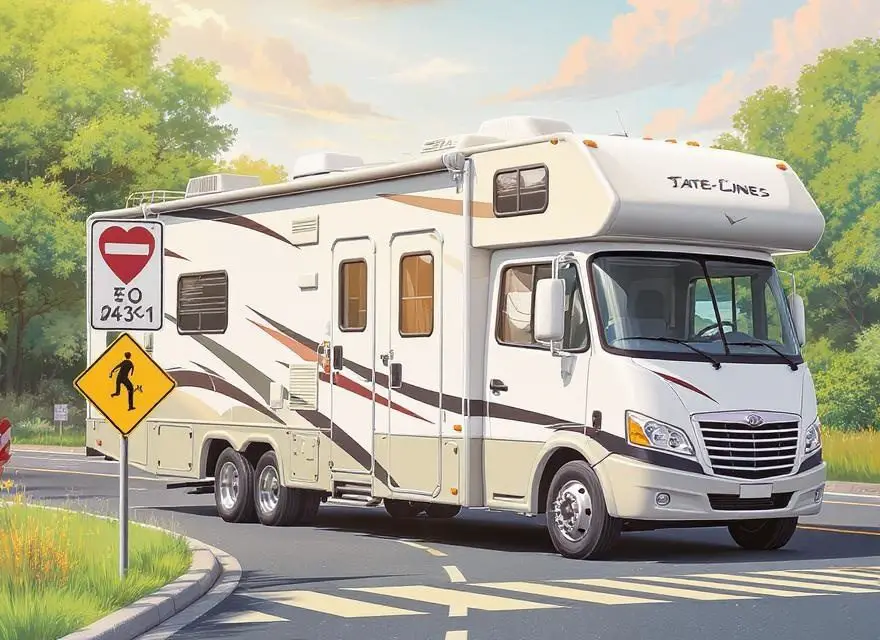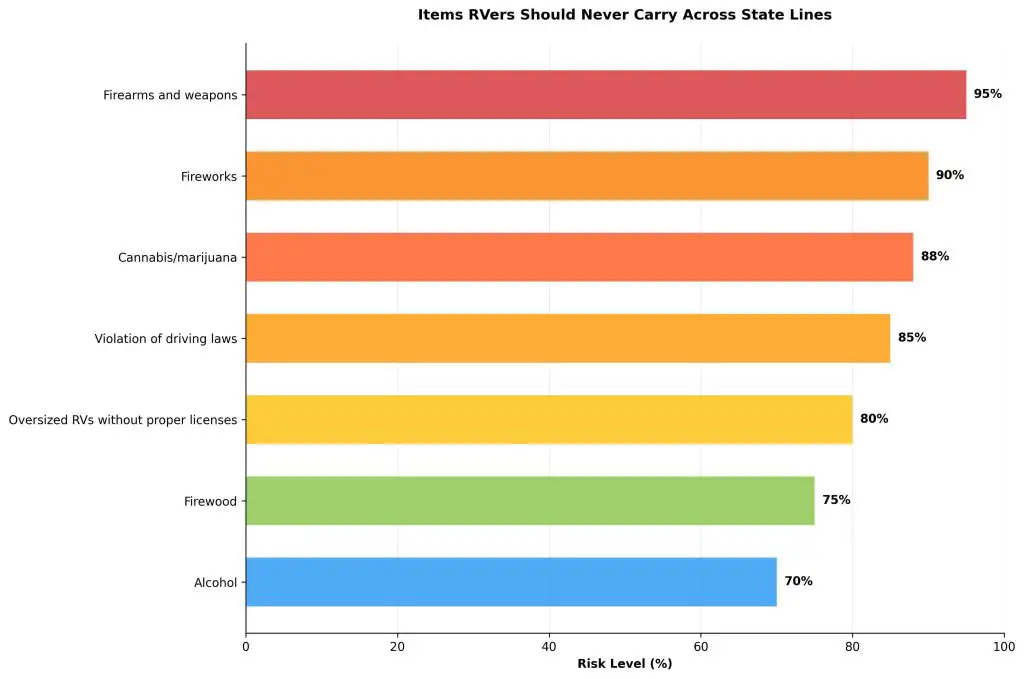Planning your next epic RV adventure across America? Before you hit the open road, you need to know about the legal landmines waiting at every state border. With over 25 million RV trips happening annually in the United States, thousands of unsuspecting travelers find themselves in legal hot water simply because they didn’t know what they couldn’t carry across state lines.
State laws vary dramatically from coast to coast, and what’s perfectly legal in one state might land you in jail in another. Think of it like playing a twisted game of legal roulette where the rules change every few hundred miles. The consequences range from hefty fines to criminal charges that could ruin your vacation permanently.
This guide reveals the seven most dangerous items that could turn your dream RV trip into a nightmare with law enforcement. Armed with this knowledge, you’ll cruise confidently across state lines while other RVers get pulled over for violations they never saw coming.
Would you like to save this article?
1. Firearms and Weapons – The Ultimate Legal Nightmare
Your firearm might be your trusted companion, but crossing state lines with it can quickly turn into your worst enemy. Gun laws change faster than a GPS recalculating your route, and they’re about as clear as trying to read a map with sunglasses on at midnight.
The Firearm Owner Protection Act allows legal transport between permitting states, but here’s the catch: every state has different rules about storage, permits, and accessibility. Some states require your gun to be locked, unloaded, and stored separately from ammunition. Others might recognize your concealed carry permit, while neighboring states treat it like toilet paper.
Supporting Facts:
- Approximately 50% of RVers admit to carrying firearms according to industry surveys
- Federal law 18 USC § 926A provides some protection, but state laws still vary dramatically
- States like New York, California, and New Jersey have particularly strict regulations that can trap unwary travelers
My Take: It’s like trying to navigate a maze blindfolded while juggling flaming torches. Sure, you might make it through, but do you really want to risk your freedom on a maybe? Keep that permit guide handy, folks – your liberty depends on it.
2. Fireworks – The Sparkler That Could Spark Legal Trouble
Nothing says “America” like blowing stuff up with colorful explosives, right? Wrong! What starts as innocent family fun can quickly explode into criminal charges when you cross the wrong state line with those Fourth of July favorites.
Fireworks laws are more confusing than a teenager’s mood swings. You can legally buy Roman candles in Pennsylvania, but drive 45 minutes north to New York and suddenly you’re a criminal mastermind with those same sparklers. Even worse, many state parks ban ALL fireworks, including those innocent little sparklers your kids love.
Supporting Facts:
- Transporting fireworks across state lines is illegal in most cases, even if legal in both states
- New York allows only snakes and sparklers, while Pennsylvania permits much larger fireworks
- State park violations can result in immediate ejection and lifetime bans
My Take: Your dog’s nervous breakdown from fireworks is probably the least of your worries when park rangers are writing you tickets. Save yourself the headache and buy local – your wallet and your pooch will thank you.
3. Firewood – The Silent Forest Killer
Who knew that innocent pile of logs in your storage compartment could be harboring more trouble than a reality TV show? Firewood restrictions exist because tiny bugs can cause billion-dollar disasters, and frankly, they don’t care about your camping convenience.
The Emerald Ash Borer alone has destroyed over 15 million ash trees and cost the United States up to $25 billion in damages. These invasive species hitchhike on firewood, spreading faster than gossip at a campground. Many states prohibit importing any untreated wood, with some requiring heat treatment at 160°F for 75 minutes.
Supporting Facts:
- Emerald Ash Borer has killed 85% of adult ash trees in affected areas
- Economic damage from invasive species costs billions annually
- New York prohibits transporting firewood more than 50 miles unless heat-treated
- The general rule is to transport firewood less than 10-50 miles maximum
My Take: That free firewood from your backyard might seem like a bargain until you’re explaining to forest service officers why you’re personally responsible for the next ecological disaster. Buy local wood – Mother Nature will sleep better, and so will you.
4. Cannabis/Marijuana – The Green Legal Trap
With 38 states legalizing marijuana in some form, you might think you can pack your stash and party across state lines. Think again! Federal law still considers cannabis illegal everywhere, making interstate transport a federal crime regardless of state laws.
Even traveling between two legal states with your legally purchased products makes you a federal criminal the moment you cross that state line. It’s like being in a legal sandwich where the bread is legal, but the filling will land you in federal prison.
Supporting Facts:
- 38 states have legalized cannabis in some form as of 2024
- Federal law still classifies marijuana as a Schedule I controlled substance
- Interstate transport remains federally illegal even between legal states
- Penalties can include federal charges and prison time
My Take: Sure, you’re living your best life in Colorado, but that joy ride turns into a nightmare when you hit Kansas. Federal agents don’t care about your medical card – they care about federal law, and federal law wins every time.
5. Alcohol – More Complicated Than You’d Think
You’d assume booze would be simple to transport, but alcohol laws are more twisted than a pretzel factory. Different states have varying rules about open containers, transport limits, and even dry counties that treat alcohol like it’s radioactive waste.
Some states allow alcohol storage in your RV’s living area, while others treat it like a regular vehicle where it must be completely inaccessible. Cross into a dry county and suddenly your perfectly legal beer collection becomes contraband faster than you can say “Prohibition.”
Supporting Facts:
- Open container laws vary significantly between states
- Some states limit the quantity of alcohol you can transport
- Dry counties still exist and prohibit alcohol possession entirely
- International border crossings require full declaration regardless of container condition
My Take: It’s ironic that something that lubricates social situations creates so much legal friction. When in doubt, declare everything and save yourself hours of interrogation. Border agents appreciate honesty more than your attempt at being clever.
6. Oversized RVs Without Proper Licenses – Size Matters Legally
Your massive 40-foot palace on wheels might make you the envy of every campground, but it could also make you the target of every weigh station. Many states require special licenses for RVs exceeding certain length or weight limits, and ignorance isn’t a legal defense.
Some states mandate CDLs for RVs over 26,000 pounds or when towing trailers over 10,000 pounds. Others have specific non-commercial license requirements. Get caught without proper credentials, and you’ll be parked indefinitely while sorting out legal paperwork.
Supporting Facts:
- License requirements vary by state for large RVs
- Some states require CDLs for vehicles over 26,000 pounds
- Special endorsements may be needed for air brakes or hazardous materials
- Violations can result in impounded vehicles and hefty fines
My Take: I actually support stricter licensing for giant RVs. If you’re piloting a 30,000-pound missile down the highway while kids fight over Cheetos in the back, maybe proving you can handle it isn’t too much to ask. Road safety isn’t just about you – it’s about everyone sharing the asphalt.
7. Violating Driving Laws – The Rules Keep Changing
Every state thinks their driving laws are special snowflakes, creating a confusing patchwork of regulations that change faster than weather patterns. Speed limits, headlight requirements, and even riding in towable RVs vary dramatically across state lines.
Some states allow passengers in fifth wheels while moving, while others consider it a felony worth 2-3 years in prison. Headlight laws, work zone regulations, and seat belt requirements all vary, creating potential violations at every border crossing.
Supporting Facts:
- Speed limits vary significantly between states
- Headlight requirements differ for rain, construction zones, and daylight hours
- Some states allow riding in towable RVs, others impose severe penalties
- Seat belt laws and enforcement vary by jurisdiction
My Take: Driving laws changing every few hundred miles makes about as much sense as having different gravity in each state. But until physics and politics align, we’re stuck playing this endless game of “Guess That Law.” Stay alert, stay informed, and maybe invest in a really good legal reference guide.
Key Statistics to Remember
| Item Category | Average Risk Level | Primary Concern |
|---|---|---|
| Legal/Criminal (Firearms, Cannabis) | 91.5% | Federal vs. State conflicts |
| Safety/Legal (Fireworks) | 90% | Fire hazards and bans |
| Environmental (Firewood) | 75% | Invasive species prevention |
| Legal/Tax (Alcohol) | 70% | Varying state regulations |
RV Travel by the Numbers:
- 25.1 million RV trips occurred in 2024 (1.2% increase from 2023)
- 11.2 million US households own RVs as of 2021
- RV travel generates $140 billion in annual economic activity
- Average RV trip costs around $100 per day for fuel, food, and site fees
Meta Description
SOURCES
- USCCA – Firearms on the Open Road: RV Travel and Camping Safety
- Don’t Move Firewood – Protect Trees From Bugs
- National Park Service – Don’t Move Firewood
- USDA – Emerald Ash Borer Economic Impact
- Camper Champ – USA RV Camping Statistics 2024
- RVIA – RV Industry Association Reports
- USDA Forest Service – Invasive Species Costs








